

Constantine Converts: 312. Why Did Christianity Succeed? - Legimitization Under Constantine. From persecuted minority to official imperial religion - what caused this extraordinary reversal for Christianity?

Shaye I.D. Cohen: Samuel Ungerleider Professor of Judaic Studies and Professor of Religious Studies Brown University The triumph of Christianity is actually a very remarkable historical phenomenon. ... We begin with a small group from the backwaters of the Roman Empire and after two, three centuries go by, lo and behold that same group and its descendants have somehow taken over the Roman Empire and have become the official religion, in fact the only tolerated religion, of the Roman Empire by the end of the 4th century. For historians, that answer, while maybe correct on one level, on another level it is not entirely satisfactory. In its first stage, Christianity begins not as a religion, it begins rather as the movement of people around a single charismatic teacher or preacher, it's hard to know what noun to use exactly.
This is how Christianity begins. Harold W. Allen D. Constantine the Great and Christianity. Lapsed Christians. Lapsed Christians<Back to Last Page ><Glossary Index> Definition: During the periods of persecution at the hands of Roman officials, Christians were given the option of performing the required sacrifices to the Roman gods and thus avoid torture and death.
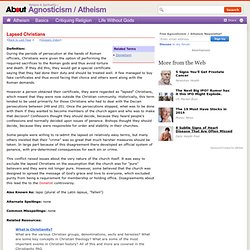
If they did this, they would get a special certificate saying that they had done their duty and should be treated well. A few managed to buy fake certificates and thus avoid facing that choice and others went along with the Roman demands. However a person obtained their certificate, they were regarded as "lapsed" Christians, which meant that they were now outside the Christian community.
Historically, this term tended to be used primarily for those Christians who had to deal with the Decian persecutions between 249 and 251. Some people were willing to re-admit the lapsed on relatively easy terms, but many others insisted that their "crime" was so great that much harsher measures should be taken. Alternate Spellings: none. Decius. Trajan Decius (Latin: Gaius Messius Quintus Decius Augustus;[1] c. 201 – June 251), was Roman Emperor from 249 to 251.
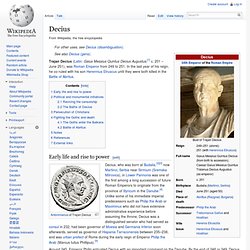
In the last year of his reign, he co-ruled with his son Herennius Etruscus until they were both killed in the Battle of Abritus. Early life and rise to power[edit] Around 245, Emperor Philip entrusted Decius with an important command on the Danube. The Development of the Canon of the New Testament - Irenaeus.
Relatively little is known of the life of Irenaeus.
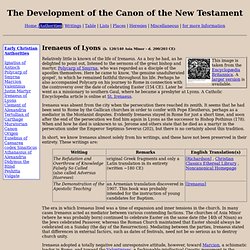
As a boy he had, as he delighted to point out, listened to the sermons of the great bishop and martyr, Polycarp of Smyrna, who was regarded as a disciple of the apostles themselves. Here he came to know, 'the genuine unadulterated gospel', to which he remained faithful throughout his life. Perhaps he also accompanied Polycarp on his journey to Rome in connection with the controversy over the date of celebrating Easter (154 CE). Later he went as a missionary to southern Gaul, where he became a presbyter at Lyons. A Catholic Encyclopedia article is online at St.
Gnosticism. Perpetua and Felicity. The Passion of St.
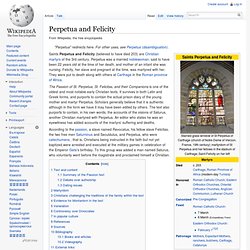
Perpetua, St. Pliny the Younger. Gaius Plinius Caecilius Secundus, born Gaius Caecilius or Gaius Caecilius Cilo (61 – ca. 112), better known as Pliny the Younger, was a lawyer, author, and magistrate of Ancient Rome.
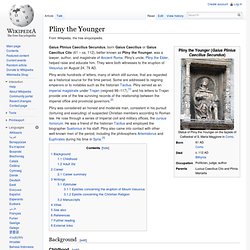
Pliny's uncle, Pliny the Elder, helped raise and educate him. They were both witnesses to the eruption of Vesuvius on August 24, 79 AD. Pliny wrote hundreds of letters, many of which still survive, that are regarded as a historical source for the time period. Some are addressed to reigning emperors or to notables such as the historian Tacitus. Pliny served as an imperial magistrate under Trajan (reigned 98–117),[1] and his letters to Trajan provide one of the few surviving records of the relationship between the imperial office and provincial governors.[2] Pliny was considered an honest and moderate man, consistent in his pursuit (torturing and executing) of suspected Christian members according to Roman law.
Background[edit] Childhood[edit] Nag Hammadi library. The contents of the codices were written in the Coptic language, though the works were probably all translations from Greek.[4] The best-known of these works is probably the Gospel of Thomas, of which the Nag Hammadi codices contain the only complete text.
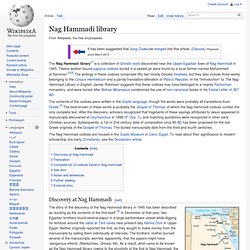
After the discovery, scholars recognized that fragments of these sayings attributed to Jesus appeared in manuscripts discovered at Oxyrhynchus in 1898 (P. Oxy. 1), and matching quotations were recognized in other early Christian sources. The Story Of The Storytellers - The Gnostic Gospels. The 52 texts discovered in Nag Hammadi, Egypt include 'secret' gospels poems and myths attributing to Jesus sayings and beliefs which are very different from the New Testament.

Scholar Elaine Pagels explores these documents and their implications. From The Gnostic Gospels by Elaine Pagels Vintage Books, New York: 1979 pp. xiii-xxiii In December 1945 an Arab peasant made an astonishing archeological discovery in Upper Egypt. Bar Kokhba revolt. The Bar Kokhba revolt resulted in genocide and almost complete depopulation of Judea and is considered to have a much more critical impact on Jews and Judaism than the Great Revolt of Judea of 70 CE.[7] Roman losses are also considered heavy, making it one of the worst campaigns of the Empire.
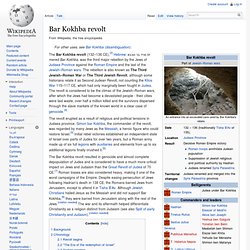
Despite easing persecution of Jews following Hadrian's death in 138 CE, the Romans barred Jews from Jerusalem, except to attend it in Tisha B'Av. Although Jewish Christians hailed Jesus as the Messiah and did not support Bar Kokhba,[8] they were barred from Jerusalem along with the rest of the Jews. [citation needed] The war and its aftermath helped differentiate Christianity as a religion distinct from Judaism (see also Split of early Christianity and Judaism). [citation needed] Background[edit]